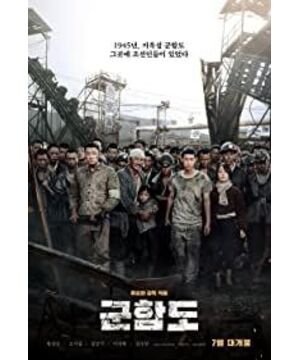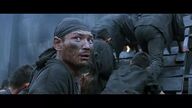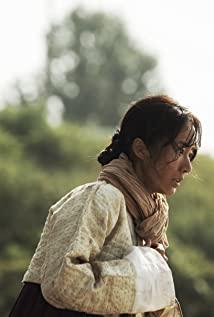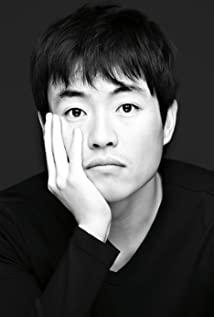South Korea's "Gunkanjima" is an anti-Japanese theme film in our eyes.
Before talking about the movie, we must briefly mention some history about Gunkanjima.
Gunkanjima, formerly known as Hashima, is an isolated island 4.5 kilometers west of Nagasaki, Japan.
Because of the abundant mineral resources buried on the island and underground, Japan has sent people to the island to mine since the Meiji Restoration period.
Gradually, the island went from being barren to being surrounded by high walls with tall buildings on the island. In 1916, Japan's first 7-story reinforced concrete residential building was built on the island, known as the "Skyscraper" of Japan at that time.
From the excavation in 1891 to the closure in 1974, Gunkanjima has been mined for nearly a hundred years, and it has been called the "Relic of the Meiji Industrial Revolution." In 2015, Gunkanjima applied for the United Nations World Heritage Site and was approved.
Japan is celebrating the whole country. Gunkanjima has also become a local tourist destination.
In the eyes of those who are accustomed to selective forgetting and avoiding history, Gunkanjima is a paradise, but for the Chinese and Koreans who were forced to mine the island during World War II, it is definitely a hell.
During World War II, thousands of civilians were forcibly drawn to Gunkanjima to engage in dangerous, brutal, and inhumane underground mining operations.
The Koreans and Chinese civilians on the island endure hunger, heat, and disease, and are used as machines.
Many people have been tortured to commit suicide by this hell island where there is no hope.
There is a huge gap in life on the island. The Japanese live a splendid life every day, with dance parties and dinner parties, and life is as usual.
But separated by a wall, the laborers who are attacked by carbon black every day are like ghosts.
Some of them live on the ground and claim to lead a fulfilling life;
while the laborers are almost always underground, begging to live in hell.
The South Korean film "Gunkanjima" takes the life of North Korean laborers on Gunkanjima during World War II and the final counterattack as a perspective to cut into this dark historical segment that is about to be forgotten.
"Gunkanjima" is very eye-catching from the director to the cast.
Director Liu Shengwan is good at war action movies and has the ability to penetrate the society and expose the false masks of reality. From "Berlin", "Improper Deal" to "Veteran", every time he strikes, he can attract fans and critics.
Liu Shengwan's balance between commerciality and artistry in the film can be described as having a certain degree, that is, he will not completely compromise with commerce. He can always tell the story vividly, which is thought-provoking and full of gimmicks under the insistence on history and society.
In the selection of actors, the three generations of outstanding actors from the old, middle and youth of South Korea are gathered.
Huang Zhengmin sits in the center and connects the whole film; the
old actor Li Jingrong and the old elders have an aura; the
small fresh meat, hot new stars Song Joong Ki and Su Zhixie are responsible for attracting female fans.
From the subject matter to the actors, "Gunkanjima" almost covers a wide range of movie fans, providing a basic guarantee for the box office.
Watching the full movie, Fat Brother builds up the scene, and is as impressed as possible with the prop making.
The harsh underground mining environment of Gunkanjima contrasts with the exquisite living space of the Japanese on the island, forming a shockingly huge contrast.
Including the exquisite costumes of the actors, the food packaging and other details have been restored to the greatest extent.
The final climax of the film is the big scene of the North Korean labor riots resisting and fleeing. It is well-arranged. Amidst the chaos, it clearly shows the turbulence of human nature. The sublimation of the main theme is also finished. restraint.
The biggest charm of "Gunkanjima" is to reflect the complex heart of the characters in the story construction.
Although it is an anti-Japanese film, "Gunkanjima" is still aimed at the unpredictable human nature, the character's choice under the high pressure of survival.
South Korean movies are often indifferent to the depiction of human nature, without fear.
This time, "Gunkanjima" puts the emphasis on the Koreans' own "fighting in the nest" on the island to reflect the true humanity.
"Warship Island" has three groups of key characters driving the plot and enriching the theme.
Huang Zhengmin's father, Li Jiangyu, and his daughter, Li Sohee, are in a line. The young actor Lee Sohee played the role of Kong Yoo's daughter in last year's hot film "Travel to Busan".
During the Japanese occupation period, Li Jiangyu and Li Suxi were well-known local musicians. Li Jiangyu is good at making money from both sides, making use of his status as a performer.
But under the great wheel of history, it's hard to have an egg. He was tricked into getting to the Battleship Island by mistake.
In order to protect his band members, especially his daughter, he continues to play the role of a small person, drawing in various forces and increasing his probability of "surviving".
In addition, there are North Korean businessman played by Lee Kyung-young, political leader Yoon Xuezhe, and agent Park Moo-young played by Song Joong-ki.
Yin Xuezhe has a very high leadership position in the minds of North Koreans. He is the spiritual leader of North Korean laborers on Gunkanjima.
Park Moo-young accepted the order of the Restoration Council, hoping to rescue Yin Xuezhe at the end of World War II, laying a solid foundation for the establishment of a new country.
The third line is the relationship story between the gangster boss Choi Chi-sung and the prostitute Wu Mo-nian played by So Ji-seop.
Cui Qixing believes in violence and re-emerged as the leader of the Gunkanjima labor community by force, wearing a Rolex watch as a symbol of power.
His infighting with the former labor leader will open the corner of the "fighting in the nest". In order to compete for a better quality of life, there are often infighting between North Koreans and North Koreans.
Yin Xuezhe kept stopping, saying "This is the situation the Japanese want to see", but it didn't have much effect.
This is where the weak eat the strong, and people follow the law of the jungle.
And the exquisite Li Jiangyu naturally acted as a fencer, and everyone acted for their own interests.
The father-daughter line is in charge of the family relationship, the ruffian and the prostitute are in charge of the love, and the agent's rescue line shows the cunning of human nature and the ruthlessness of war and politics.
As the story progresses, we discover that the biggest enemy of North Korean labor is not the head of the laborers, nor the Japanese who sit on the mountain and watch the tigers fight, but their spiritual leader, Yin Xuezhe.
Yin Xuezhe and the director of Gunkanjima took the wages of all laborers for their own interests, and obtained huge money through various means of cursing human life.
During the awakening of human nature, agent Park Moo-young exposed his hypocrisy. The little character Lee Jiang-woo stood up, and the ruffian took the prostitute he loved and started the last stop with the Japanese soldiers in Gunkanjima.
The climax of the story is arranged on the eve of Japan's surrender.
After Hiroshima was hit by an atomic bomb, Gunkanjima was ordered to destroy labor evidence. After a bombing, Gunkanjima was in a mess, providing opportunities for counterattack and escape.
The massacre of Japanese soldiers and the escape of North Korean workers brought the story to the final climax!
In the end, the film ended with the drop of the Nagasaki atomic bomb.
The laborers who have experienced all kinds of difficulties witnessed the mushroom cloud of the atomic bomb on the fleeing ore ship, which announced the complete end of life in the hell of Gunkanjima, and was also a historical image of Japan's complete surrender in World War II.
Although "Gunkanjima" focuses on the "fighting in the nest" among North Korean laborers, it expresses the dark side of human nature under the conditions of money and power and the desire to survive.
But at the same time, we also saw that the director still puts the brightest side of human nature, family affection in the first place, and the father-daughter line runs through the film.
Looking for the crevices of human nature, the gentleness that is concealed in the coldness;
the fragile moments are glimpsed in the rigid people;
the fluctuations of the soul are searched in the absolute order;
the gaps in the secular cities that are as solid as gold can be broken through and fit;
with Therefore, the most complete picture of the soul is shown in those who are impossible.
This is the power of the film, and it is also the advanced mode for the successful transmission of its mastering thought.
"Gunkanjima" chose such a story structure in exposing history. It can be seen that it eliminates catharsis and still uses the family affection that ordinary fans can easily believe as the "source power", making the film appear real and have a texture.
In this regard, domestic films are indeed worth learning from.
Finally, say a digression.
In the process of Gunkanjima's inscription, there were large-scale protests in South Korea.
But in China, Chinese people know little about this period of history.
However, the number of Chinese laborers on Gunkanjima is actually higher than that of North Korean laborers.
How can our grief become their glory!
Backstage replied, Gunkanjima, Fat Brother sent this memorable history.
View more about The Battleship Island reviews











